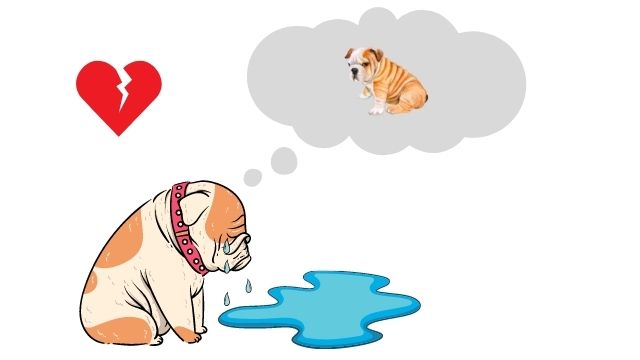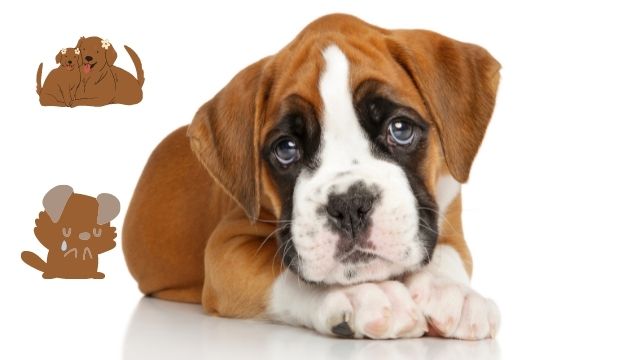Taking care of newly born pups is a responsible task, but also an amazing one. It is rewarding, affectionate, and fulfilling both for you and the mother dog. But what happens when the pups grow and leave? Is the separation normal or cruel?
Dog depression after puppies leave – is it possible? In theory, yes, it is possible for the mother dog to get depressed after her puppies leave. However, if done properly, the separation process does not have to be distressing or uncomfortable in practice. After all, the separation is natural; it just needs to be organized correctly.
In this article, we will talk about pups’ feelings after being separated from the mother and how the mother feels after her motherly duties are over. Keep reading to learn everything you need to know about this topic.
WHEN SHOULD PUPPIES LEAVE THEIR MOM?
The general rule of thumb is that dogs can be separated from their mother when around eight weeks old. However, there are individual variations. For example, while some puppies fail to learn the basics of canine behavior and need more time with their mothers (until twelve weeks or more), others do not.
In fact, some mothers get bothered by their puppies, especially if they still try to suckle (which is hurtful because of the small and sharp baby teeth) or are too playful and do not let the mother rest. In such cases, it is not uncommon for the mother to snap at the babies and scold them.
DO DOGS MISS THEIR PUPPIES?

Whether dogs miss their puppies is something that depends on various factors – including breed, separation from, and whether the separation is performed gradually or abruptly. However, there are also individual factors that need to be considered. Let’s take a closer look at the factors influencing the answer to this question.
Factor number 1: The dog’s breed
Not all dogs are equally affectionate towards people and other dogs. This applies to their babies too. Simply put, just like in humans, in the canine world, not every bitch is born to be a dam and have babies. In fact, some dogs may even attack or eat their babies. For example, there are anecdotal suggestions that Bull Terriers are extremely likely to harm their puppies. It is not known why this occurs and what makes the breed predisposed to such hostile behavior.
Factor number 2: The birth-giving process
It is a well-established fact that the birth-giving process affects the strength of the mother-to-puppies bond. Namely, mother dogs giving birth naturally form stronger bonds with their pups than dogs with puppies delivered via Caesarean section. This is because when the puppies go through the birth canal, they stimulate a release of hormones and chemicals important for proper bond formation.
Factor number 3: Separation timing
Puppies depend on their mothers until around eight weeks old. After this point, they are more or less capable of managing on their own. Mother dogs naturally know this timeframe. Therefore, the chances of the mother missing her puppies are much higher if they are taken before the age of 8 weeks. Considering this fact, responsible pet owners and breeders never separate the puppies from the mother before eight weeks.
Factor number 4: Separation method
The timing is important, but so is the separation method. Namely, mother dogs are more likely to feel sad if all pups are taken at the same time. This is not recommended for other reasons too. Namely, suppose all puppies are separated at the same time. In that case, the mother is at risk of developing mastitis (painful inflammation of the mammary glands) since the milk will start accumulating. It is advisable that the separation is organized gradually over a longer period.
MOTHER DOG MOURNING LOSS OF PUPPIES?
It is possible for the mother dog to become depressed or at least distressed if her puppies are taken away too early or suddenly. In fact, these scenarios can have negative health effects too. Here are some tips on how to make the separation process easy and natural.
Tip number 1: Never take the puppies before it is time
We have already discussed this topic. In general, puppies need around eight weeks with their mothers. However, some dogs may need more and do perfectly well when separated when older – around twelve weeks. The exact separation time is something you should decide based on the circumstances, but it must not be done before the eight weeks timeframe.
Tip number 2: The mother is not a babysitter
If you decide to keep the puppies for longer or to keep one or two puppies with the mother, keep in mind that the mother is not a free-of-charge babysitter. The mother can be allowed to spend as much time as she wants with the puppies, but she must be allowed to leave when she becomes annoyed by their presence. While some mother dogs do not mind spending all their time with the puppies, others prefer to rest unbothered.
Tip number 3: Be considerate after taking away the puppies
While mothering her puppies and teaching them the secrets of the canine life and behavior, your dog invested time and effort. This is something you need to recognize and reward. Therefore, once the puppies leave, you should leave the dog rest and indulge her with the things she wants. One of the things all dogs love is spending time with their human families. You should try to be more attentive to your dog’s needs and engage in more interactive activities.
Tip number 4: Special food and exercise regimen
After separating the mother from the puppies, you need to get your dog back on the normal track and practice regular feeding and exercising regimen. It is not uncommon for dogs to experience declined coat quality after giving birth. Manage this problem by feeding high-quality food and supplements supporting healthy skin and shiny coats.
Tip number 5: Give frequent belly rubs
It goes without saying that dogs enjoy being belly rubbed. Therefore this activity will definitely make your bond stronger. However, there is a hidden reason behind the belly rubs. Namely, this is an excellent time to check for mastitis signs. Mastitis is manageable but can cause complications if it goes unnoticed and untreated for longer.
DO PUPPIES GET SAD WHEN SEPARATED FROM THEIR MOM?

Yes, puppies do get sad when separated from their mother and littermates. However, this transient feeling passes as soon as the pup settles into its new home and finds comfort in its new family. This is the reason why when taking a new puppy home, you need to put extra effort – always be available and ensure your pup feels safe and loved.
It is also imperative not to scold or punish your puppy at this point – both you and your new puppy are adjusting, and you will need some time to learn how to live with each other.
IS SEPARATING PUPPIES FROM MOTHER CRUEL?
Separating puppies from the mother is not cruel when it is done correctly and at the right time. Puppies love and need their mother’s care during the early phases of their lives. The mothers are aware of this, but they are naturally wired to take care of the pups only for a limited timeframe. Therefore, a separation moment is bound to happen.
In the wild, the separation between pups and mothers is perfectly normal and has an evolutionary component. Namely, the young separate from their families to avoid inbreeding – a common occurrence that can lead to genetic issues and abnormalities.
However, when it comes to pet dogs, many owners question the ethical aspect of separating puppies from their mothers. Some even consider it is better to keep the mothers and their pups together. As fun as this may sound, it is not practical.
For example, dogs can have between one and thirteen puppies depending on the breed, meaning one would need a farm-sized property to keep the entire social group together while providing adequate living conditions.
Additionally, as already mentioned, mother dogs are genetically predetermined to care for the puppies for an adequate time frame. Once the puppies reach a certain age, the mothers are no longer interested in activities involving the pups. In fact, they feel relieved once the puppies are removed from the picture. This is important from a physiological point, too (the teats get a rest, and the reproductive organs can start preparing for the next heat and potential pregnancy).
SUMMING UP: DOG DEPRESSION AFTER PUPPIES LEAVE
When done properly, the separation between the puppies and the mother is neither a cruel nor a depressing moment. While it is true that the bond between the mother and the pups exists, and they know and love each other after being separated, the separation is a normal and expected moment.
Obviously, the separation can be harder on the pups as they leave and adjust to new conditions and living environments. However, the concept of separation is usually much harder for the owners, especially if new, than it is for the dogs themselves.

